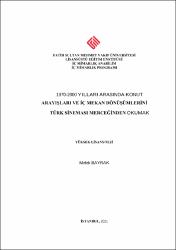| dc.contributor.advisor | Salbacak, Salih | |
| dc.contributor.author | Bayrak, Melek | |
| dc.date.accessioned | 2021-08-19T15:30:26Z | |
| dc.date.available | 2021-08-19T15:30:26Z | |
| dc.date.issued | 2021 | en_US |
| dc.identifier.citation | BAYRAK, Melek, 1970-2000 Yılları Arasında Konut Arayışlarını Ve İç Mekan Dönüşümlerini Türk Sineması Merceğinden Okumak, Fatih Sultan Mehmet Vakıf Üniversitesi Lisansüstü Eğitim Enstitüsü İç Mimarlık Anabilim Dalı İç Mimarlık Programı, Yayımlanmamış Yüksek Lisans Tezi, İstanbul 2021. | en_US |
| dc.identifier.uri | https://hdl.handle.net/11352/3829 | |
| dc.description.abstract | Türk toplumunda aile: hukuk, gelenek, inanış ile aidiyet üzerinden şekillenen kurumsal bir yapıyı ifade eder süreklilik gösterir ve dinamiktir, hane halkı sayısına göre de büyük ve çekirdek biçimde sınıflandırılır. Kendi toplumu içerisindeki en küçük birimi temsil eden Türk ailesi toplumsal bellek üretiminde: Roman, öykü, şiir gibi yazılı eserlerin yanı sıra sinema endüstrisinde de toplumun gelenekselliği, dönüşümü ve kırılmaları üzerinden senaryolarda yer bulmuştur. 1960’dan günümüze gelişen Türk sinemasına Yeşilçam adı verilmektedir. Yeşilçam: Aile temasını romantizm, dram, komedi, gerilim, trajedi ve fantastik denemeler gibi anlatımlarda senaryolaştırmış, izleyicinin beklentileri doğrultusunda da aktör ve aktrislerin yanı sıra mekân temsilleri ile de desteklenmiş hatta bazı yapıtlarda aile teması mimari bir yapı tipi konut üzerinden kurgulanmıştır. 1960’lı yıllarda dünyada başlayan özgürleşme ve yenileşme düşüncesi Türk sinemasında da karşılık bulmuştur. Bu değişim sürecinde sinemada: Ailenin yeri, Osmanlıdan süregelen batılılaşma çabaları, kentli aile, köyden kente göç ve ideolojik gelişmeler, işçi işveren anlatımları ile süreç sonrasında toplumsal gerçeklik, cinsiyet kavramlar içerisinde kadın öyküleri de işlenmiştir.
Yeşilçam yapıtlarındaki toplumsal değişim ve dönüşüm süreçleri içerisindeki ailenin dramları ile iç mekânları arasında paralellikler bulunmaktadır. Özellikle modern kavramının sorgulandığı ve gelenek gelecek tartışmaları; popüler üslupta döşenmiş konutlar, konfor çağrışımları, alt ve üst gelir gruplarının yaşam biçimleri ve göç olgusu, dış koşullarla mücadele eden ailenin barınma çabası ile konut özlemleri bu paralel gelişimlerdendir. Bu çalışmada: 1970-2000 yılları arasında Türk ailesinin komut arayışını, mekân gereksinimlerini, özlem ve beğenilerinin iç mekâna yansıması, kültür, kimlik, mekân ve mekânın temsili bağlamında 1970-2000’li yıllar arasında seyirci karşısına çıkan komedi, dram, trajedi, gerilim gibi temaları içeren sekiz yerli film üzerinden konutun durumu, dönemsel analiz ve mekânsal gelişmelerin belgelenmesi hedeflenmektedir. | en_US |
| dc.description.abstract | In Turkish society, the family expresses an institutional structure shaped by law, tradition, belief and belonging. It shows continuity and is dynamic. It is classified as large and core according to the number of households. The Turkish family, representing the smallest unit in its own society: In addition to written works such as novels, stories and poems, it has also found a place in the scenarios of the traditionalism, transformation and breakages of society in the cinema industry. Turkish cinema that has developed since 1960 is called Yeşilçam. Yeşilçam: The family theme was scripted in narratives such as romance, drama, comedy, thriller, tragedy and fantastic essays, the expectations of the audience were supported by actors and actresses as well as spatial representations, and even in some works, the family theme was constructed through an architectural building type residence. The idea of emancipation and innovation, which started in the world in the 1960s, was also met in Turkish cinema. In this process of change, the place of the family, the ongoing westernization efforts from the Ottoman Empire, the urban family, the migration from the village to the city, and the ideological developments, worker and employer expressions, social reality, gender concepts and women's stories were also covered after the process. There are parallels between the drama of the family and the interior spaces within the social change and transformation processes in Yeşilçam works. Especially the modern concept is questioned and the discussions of tradition and future; Residences furnished in popular style, connotations of comfort, lifestyles of lower and upper income groups and migration phenomenon are among these parallel developments in the housing effort and housing aspirations of the family struggling with external conditions. In this study: The reflection of the Turkish family's search for command, space needs, longing and tastes on the interior between 1970 and 2000, in the context of culture, identity, space and the representation of space, themes such as comedy, drama, tragedy, thriller that appeared before the audience from 1970 to 2000. It is aimed to document the situation of the house, periodical analysis and spatial developments through eight local films. | en_US |
| dc.language.iso | tur | en_US |
| dc.publisher | Fatih Sultan Mehmet Vakıf Üniversitesi, Lisansüstü Eğitim Enstitüsü | en_US |
| dc.rights | info:eu-repo/semantics/openAccess | en_US |
| dc.subject | Mekân | en_US |
| dc.subject | İç Mekân | en_US |
| dc.subject | Sinema | en_US |
| dc.subject | Modernleşme | en_US |
| dc.subject | Toplum | en_US |
| dc.subject | Space | en_US |
| dc.subject | İnterior | en_US |
| dc.subject | Cinema | en_US |
| dc.subject | Modernization | en_US |
| dc.subject | Social Reality | en_US |
| dc.title | 1970-2000 Yılları Arasında Konut Arayışlarını Ve İç Mekan Dönüşümlerini Türk Sineması Merceğinden Okumak | en_US |
| dc.title.alternative | Reading Residential Searches and Interior Transformations Between the Years 1970-2000 from the Center of Turkish Cinema | en_US |
| dc.type | masterThesis | en_US |
| dc.contributor.department | FSM Vakıf Üniversitesi, Lisansüstü Eğitim Enstitüsü, İç Mimarlık Ana Bilim Dalı | en_US |
| dc.relation.publicationcategory | Tez | en_US |
| dc.contributor.institutionauthor | Bayrak, Melek | |



















